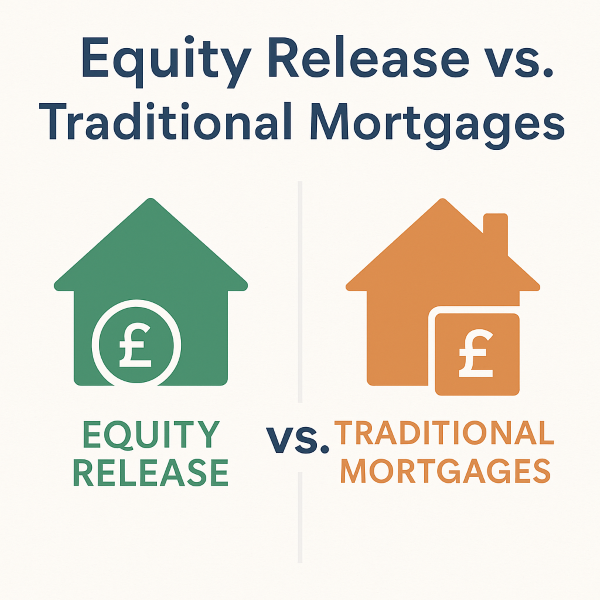A lifetime mortgage is a loan secured against your home’s value. You remain the property’s owner and can continue living there. Repayment typically occurs when you pass away or move into long-term care.
This option allows homeowners to release equity from their property, making it a popular choice for retirement planning. It’s also suitable if you want to provide financial assistance to family members. The loan is repaid through the sale of your home, but you may reserve part of the property’s value as inheritance for your loved ones.
When choosing a lifetime mortgage, you can borrow either a lump sum or an initial smaller loan with further amounts available over time. This flexibility, known as a drawdown, suits varying financial needs.
This guide provides essential details about lifetime mortgages for homeowners considering this financial solution.
- How does a lifetime mortgage work?
- Who is eligible for a lifetime mortgage?
- Lifetime mortgage pros and cons
- Lifetime mortgages explained: FAQs
How does a lifetime mortgage work?
If you’re 55 or older and own your home outright or have an existing mortgage, a lifetime mortgage could be an option. This type of mortgage allows you to release equity from your property while retaining full home ownership.
How Lifetime Mortgages Work
Interest is charged on the amount borrowed and added to the total secured loan balance. Factors such as your age and property value will influence the interest rate. Importantly, you can remain in your home until you pass away or require long-term care. At that point, the property is typically sold to repay the loan.
Lifetime mortgage providers usually offer equity release amounts ranging from £10,000 to £100,000. You may take the funds as a lump sum or withdraw smaller amounts as needed.
Key Benefits and Uses
If you still have a mortgage, funds released through a lifetime mortgage must settle that debt first. Afterwards, you can use the remaining money for various purposes, such as:
- Funding holidays
- Making home improvements
- Helping children with their first property purchase
Who is eligible for a lifetime mortgage?
To qualify for a lifetime mortgage, applicants must meet specific criteria. Firstly, all applicants should be aged between 55 and 85. Additionally, the application can be made individually or jointly. The property involved must serve as your primary residence. Furthermore, eligibility is limited to properties located in England, Scotland, or Wales. Lastly, applicants must already own the property in question.
A lifetime mortgage could be an excellent choice for individuals planning their retirement. It allows you to access the equity in your home to enhance your financial situation. This type of mortgage is suitable for a variety of purposes, such as:
- Settling an existing mortgage on a second property
- Extending your current home
- Funding a new kitchen, conservatory, or bathroom
- Booking a once-in-a-lifetime holiday
- Providing a financial gift to family members
- Assisting grandchildren with wedding costs or tuition fees
If you want to estimate how much equity is in your property, consider these steps. Start by checking average house prices in your area. Alternatively, arrange for your property to be professionally valued.
This option provides financial flexibility in retirement, with many using it to achieve personal or family goals. However, it’s crucial to assess the suitability of a lifetime mortgage for your circumstances. Always seek independent financial advice before proceeding.
Understanding the Basics of Lifetime Mortgages
Deciding to take out a lifetime mortgage is a significant step requiring thorough consideration. This type of mortgage lets you access funds as a lump sum or smaller amounts over time while retaining ownership of your home. Repayment occurs when the last borrower passes away or enters long-term care. However, it’s crucial to remember that interest accrues, increasing the total amount owed.
Key Features and Protections
Lifetime mortgages offer flexible options, such as setting aside a portion of your home’s value to preserve inheritance. The “No Negative Equity Guarantee” protects your estate, ensuring you never owe more than the home’s sale value. Moreover, you can relocate to a new property that meets the lender’s criteria without incurring early repayment charges. Overpayments are allowed within limits, but exceeding these may lead to penalties unless due to death or long-term care.
Potential Impacts to Consider
It’s essential to be mindful of how a lifetime mortgage might affect your entitlement to means-tested benefits. While monthly payments aren’t required, the accumulating interest could significantly impact the inheritance you leave behind. Consulting an experienced adviser ensures the decision aligns with your financial needs and future goals.
For advice on Lifetime mortgages, Connect Lifetime Morgages’ Richard Jeremiah-Clarke is here to help,
Thank you for reading our “What is a lifetime mortgage? | Connect Lifetime Explains. Stay “Connect“-ed for more updates soon!






